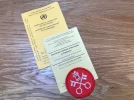I do not think the corona virus experience will lead to profound changes in all of us, but I think the camino will change profoundly. And I think our collective need to get back to normal will clash with the the profound changes that are going to happen along the camino.
As much as I would love to think that this corona virus will work some major changes in our lives -- less materialism, more empathy, back to basics, whatever -- I just don't think it will have such an impact, at least in the short term. Yes, I think the experience will leave an imprint on us that may slowly lead to re-evaluations over time, but I think such change will be a slow and imperceptible process -- something like the way the Great Depression or the Vietnam War marked earlier generations..
Rather, I think most people are anxious to "return to normal." One only has to look at many of the posts in this forum to find evidence for this. I don't see much concrete thinking about how our individual lives and circumstances will change. Yes there is lots of high level pondering, but not a lot of on-the-ground thinking. Regarding the camino, we are anxious to have the camino experience that others have had or to recreate our prior experiences. We are debating the best albergues, the lightest gear and so on. Many of us (me included) want to try to "fix" the challenges we imagine by doing things like throwing money at the camino so the businesses will all be there when we come back. We really aren't imagining a profoundly different camino experience. We are just thinking the beds in albergues might be further apart.
I think
@Rebekah Scott is spot on when she says
There's going to be a whole lot less infrastructure for a while. A lot of places are not going to survive the crisis. The Spanish tourism industry and the Camino jefes will struggle to find the new rhythm, creating instability. Tourists hate places that are not sure and cut & dried. They will stop coming.
Pilgrims will come, or come back again, and find the camino is not what they expected. Things will be more expensive. The trail will be more rugged and challenging, with longer walks between stops and fewer options once they arrive. There may well be more religion going on. There will be fewer pilgrims, and fewer places desigened only for them, and fewer services built around their needs.
The Camino may fall out of fashion for a few years, or many years.
It's happened before.
I don't mean to be critical of all of our efforts and thoughts and plans for future caminos. I am right in there with everyone else. I have to cancel my upcoming August camino and have distracted myself for hours during quarantine, planning the camino I will replace it with. Should I walk the Via de la Plata or should I combine the Vasco, Frances and Invierno? I am meticulously planning out my stages on each alternative in reliance on all the guides and posts of the past even though I
know that many albergues, bars and stores will not reopen. I know I will return, but in my heart of hearts I know it will be to a profoundly different place and experience. I will need to walk further, pay more, carry a bigger pack with things like a sleeping pad, sleeping bag and increased food supplies .
I think these changes will disappoint and deter many would-be pilgrims. Some people will not be able to physically deal with the changes -- the distances will be too far, the pensions and casa rurals will be fewer, maybe the mochilla services some need will be out of business. Many others will be worried, sad, disappointed, afraid and deterred by these changes.
I think we will all have to be ready to walk a more difficult and risky camino.





























